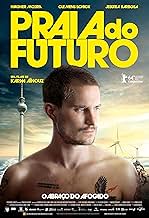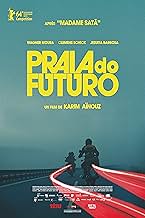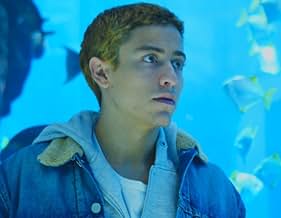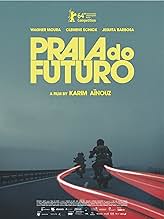VALUTAZIONE IMDb
6,3/10
3521
LA TUA VALUTAZIONE
Aggiungi una trama nella tua linguaShortly after failing to rescue a drowning man, Donato meets Konrad, a friend of the victim. They soon begin a relationship which seems doomed from the start, while Donato's past catches up ... Leggi tuttoShortly after failing to rescue a drowning man, Donato meets Konrad, a friend of the victim. They soon begin a relationship which seems doomed from the start, while Donato's past catches up with him.Shortly after failing to rescue a drowning man, Donato meets Konrad, a friend of the victim. They soon begin a relationship which seems doomed from the start, while Donato's past catches up with him.
- Regia
- Sceneggiatura
- Star
- Premi
- 11 vittorie e 20 candidature totali
Demick Lopes
- Capitão Motta
- (as Démick Lopes)
Yannik Burwiek
- Filho de Heiko
- (as Yannik Burwieck)
Jesuíta Barbosa
- Ayrton - 18 anos
- (as Jesuita Barbosa)
Recensioni in evidenza
The thing that struck me the most about this movie is how beautiful it is, and I mean literally, aesthetically. Not only is the scenery gorgeous, but also its camera work is outstanding: Praia do Futuro's shots are absolutely amazing, most scenes could be made into pictures to be hung on the walls of an art gallery - there could probably be a whole exposition just made with screenshots of this movie.
The film's appeal, however, doesn't go much beyond that. Its plot had potential, the trailer made it seem like it would be intense and deeply emotional, yet the whole story is quite dull, with some unclear or poorly explained parts and underdeveloped dialogue. The characters don't lack depth per se, but their personalities were rather shallowly explored, perhaps hindered by the lack of vocal expression or by the stumbling plot.
Contrarily to what a review I read (in another website) suggested, I did not feel like this movie was too cliché-ridden, and the unoriginal moves were fairly understandable, as they could be justified by either the situation in which they were inserted or the characters' psyche. Yet, I feel the innovative elements were obscured by the overall dephtlessness of the whole production and great ideas and quotes were lost in senselessness and barely-existent dialogue.
This is definitely not a bad movie, it was just not enough to touch or affect me in any way.
The film's appeal, however, doesn't go much beyond that. Its plot had potential, the trailer made it seem like it would be intense and deeply emotional, yet the whole story is quite dull, with some unclear or poorly explained parts and underdeveloped dialogue. The characters don't lack depth per se, but their personalities were rather shallowly explored, perhaps hindered by the lack of vocal expression or by the stumbling plot.
Contrarily to what a review I read (in another website) suggested, I did not feel like this movie was too cliché-ridden, and the unoriginal moves were fairly understandable, as they could be justified by either the situation in which they were inserted or the characters' psyche. Yet, I feel the innovative elements were obscured by the overall dephtlessness of the whole production and great ideas and quotes were lost in senselessness and barely-existent dialogue.
This is definitely not a bad movie, it was just not enough to touch or affect me in any way.
Rather introspective, this Brazilian/German film, with little plot and a lot of propositions easy to follow, but maybe not that easy to understand. The story centers on a safeguard attracted to a man he saves. They soon go for sex, softly depicted in the movie. Next they go to Germany, in a process of inner evolution for the Brazilian lead that may be difficult for the appetite of American audiences, little is spoken. A Brazilian like me does understand it better, for it's a dilemma most common for a man divided between its original family and a life he thinks ought to be better. The principals are the continuum of the film, both handsome, specially the well-built safeguard. It was already discussed that the word 'love' is not part of the plot. Not a single time it is mentioned they could experiment this sentiment to one another, and one will really have to speculate on which were the inner movements that made the Brazilian immigrate. Not an easy film, but I think it worth the effort. A trivia: in Brazil, where Wagner Moura is well known and the film went to commercial circuit, the sex scenes were a scandal. So much so that audiences where advertised in the tickets about the subject.
As a film it is perfect. Each image holds a visual interest, and the use of Bowie and Eno's ' Heroes ' lifts the film to a higher level at the end despite the fact that what went before largely fails. So where for me is the fault ? For all its beauty the casting was wrong. Wagner Moura does not convince as being a man sexually attracted to his partner played by Clemens Schick. But without too many spoilers the story is about a Brazilian lifeguard ( Moura ) who fails to save a life and has a relationship with the dead man's companion ( Schick ). I perceived hardly any connection at all between them, and the sexuality also failed to convince. The film is in three parts, the first set on Futuro Beach and the following two parts in Berlin, where the lovers attempt to continue their relationship, but when Moura's young brother appears events lead to the climax of the film. The young brother is played by Jesuita Barbosa and his presence on screen is electric, at last bringing the film to a strong and vivid sense of life. The scenario helps him, but he gives a lot to make the film breathe, despite the fact that most of the action throughout is set brilliantly against seascapes and architecture ( the former East Berlin is exceptionally good. ) Antonioni could not have done better, and a little like Antonioni there is a void in the film. With the Italian director it was often painful to watch but here it seems to be decorative. The void is of course the lack of connection between people, and in ' Futuro Beach ' it seemed to come from a lack of conviction between the two lovers. Love by the way is never mentioned and this too added to the void. And also I was disappointed by the use of gay cliched images often used in ' Gay ' films. The obsession for shower scenes, and for brief views of male genitals as if they had to be there. In some films the penis adds to the passion in a film, but coy images of the penis in this film did not. Apparently an oral sex scene was cut for distribution. It was not missed, and only the younger brother in a sexual scene with a woman seemed truthful and honest, and had a sense of urgency in it. I am not going into Brazil's shock at seeing one of their favourite actors as a gay man, but the director should have known that and considering the actor was only moderately convincing with his broody, hangdog look should have chosen someone less known. Gay/Queer film works at its best when the actors are not weighed down with a heterosexual following. That is my opinion which others may well reject, but there are actors out there like Felix Maritaud who kind of prove my point. But a justified seven for the beauty of the images and the real sense of place. It took a heterosexual character to wake me up. In a ' Gay ' film ?
beautiful, bitter, useful. a film about relations and choices. delicate poetry and good performances. not comfortable but touching for its honesty, for the landscapes, for the dialogs and for the grace of silence. a film about love and its decision, about guilt feelings and about gestures who are only exercise to know happiness. about the responsibility. and about the past who remains the skin of present. short- a beautiful film. not in ordinary manner but that detail defines it. because it is the work of an admirable director who use the right nuances for a story who might be almost cruel. a gentle speech about the sense of life.
Actually, this movie does not bring anything new to the Brazilian cinema.
I found its story totally lame. What about this synopsis after all? And it solely relies on the (already-way-too-mainstream) shocking sexually-appealing feature.
Also, German seems like the easiest language to be learned by a regular Brazilian, as the confusing time line does not allow to understand how long the main character spends on Germany. Same for his young brother, for whom the language-learning process has - again - a lame explanation.
Score is 3 out of 10 just for the few nice shots, even though the slowness of this movie is definitely boring.
I found its story totally lame. What about this synopsis after all? And it solely relies on the (already-way-too-mainstream) shocking sexually-appealing feature.
Also, German seems like the easiest language to be learned by a regular Brazilian, as the confusing time line does not allow to understand how long the main character spends on Germany. Same for his young brother, for whom the language-learning process has - again - a lame explanation.
Score is 3 out of 10 just for the few nice shots, even though the slowness of this movie is definitely boring.
Lo sapevi?
- QuizAccording to Clemens Schick, he and Wagner Moura did not get along when they first met, but became close friends after filming their scenes.
- BlooperWhen Konrad drives around on a KTM in Germany, the motor noise you hear is clearly from a 4-in-a-row cylinders engine. But KTM only manufactures 1 and 2 cylinders motors that would never sound like this.
- Versioni alternativeThe first love scene in the film's Part II section (containing footage of oral sex being performed) was cut in the theatrical/home video release.
- Colonne sonoreHeroes
Written by David Bowie and Brian Eno
I più visti
Accedi per valutare e creare un elenco di titoli salvati per ottenere consigli personalizzati
- How long is Futuro Beach?Powered by Alexa
Dettagli
- Data di uscita
- Paesi di origine
- Siti ufficiali
- Lingue
- Celebre anche come
- Futuro Beach
- Luoghi delle riprese
- Aziende produttrici
- Vedi altri crediti dell’azienda su IMDbPro
Botteghino
- Budget
- 4.000.000 USD (previsto)
- Lordo Stati Uniti e Canada
- 20.262 USD
- Fine settimana di apertura Stati Uniti e Canada
- 3324 USD
- 1 mar 2015
- Lordo in tutto il mondo
- 779.835 USD
- Tempo di esecuzione
- 1h 46min(106 min)
- Colore
- Proporzioni
- 2.35 : 1
Contribuisci a questa pagina
Suggerisci una modifica o aggiungi i contenuti mancanti

























